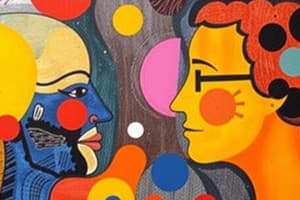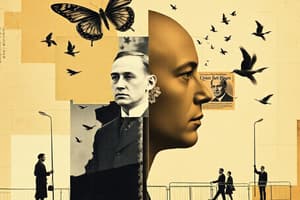Podcast
Questions and Answers
What is Stage Theory?
What is Stage Theory?
The idea that an individual must pass through one stage of development before he or she can reach the next stage.
Who created the Cognitive Development Stages theory?
Who created the Cognitive Development Stages theory?
Piaget
What is the age range for the Sensorimotor stage?
What is the age range for the Sensorimotor stage?
0-2 years
What is Stranger Anxiety?
What is Stranger Anxiety?
What does Object Permanence refer to?
What does Object Permanence refer to?
What age range corresponds to the Preoperational stage?
What age range corresponds to the Preoperational stage?
What is the age range for the Concrete Operational stage?
What is the age range for the Concrete Operational stage?
What is Conservation of matter?
What is Conservation of matter?
What is the age range for the Formal Operational stage?
What is the age range for the Formal Operational stage?
Who developed Psychosocial Development theory?
Who developed Psychosocial Development theory?
What is the age range for the Trust vs. Mistrust stage?
What is the age range for the Trust vs. Mistrust stage?
What is the second stage of psychosocial development?
What is the second stage of psychosocial development?
What is the age range for the Initiative vs. Guilt stage?
What is the age range for the Initiative vs. Guilt stage?
What is the age range for Industry vs. Inferiority?
What is the age range for Industry vs. Inferiority?
What is the age range for Identity vs. Confusion?
What is the age range for Identity vs. Confusion?
What is the age range for Intimacy vs. Isolation?
What is the age range for Intimacy vs. Isolation?
What is the age range for Generativity vs. Stagnation?
What is the age range for Generativity vs. Stagnation?
What is the age range for Integrity vs. Despair?
What is the age range for Integrity vs. Despair?
What are Psychosexual Stages?
What are Psychosexual Stages?
What is the age range for the Oral stage?
What is the age range for the Oral stage?
What is the age range for the Anal stage?
What is the age range for the Anal stage?
What is the age range for the Phallic stage?
What is the age range for the Phallic stage?
What is the age range for the Latency stage?
What is the age range for the Latency stage?
Flashcards are hidden until you start studying
Study Notes
Stage Theory Overview
- Stage theory highlights that individuals progress through a series of developmental stages, with each stage building on the previous one.
Cognitive Development Stages (Piaget)
- Developed by Jean Piaget, this theory describes cognitive growth through four stages of increasing complexity.
- Focuses on thinking, reasoning, and language development over time.
Sensorimotor Stage
- Occurs from ages 0-2, representing the first cognitive stage.
- Infants primarily understand the world through sensory experiences and actions.
- Key developments include object permanence and the onset of stranger anxiety around 9 months.
Stranger Anxiety
- An emotional response characterized by fear of unfamiliar people, beginning at about 9 months of age.
- Emerges during the sensorimotor stage as infants develop attachment to familiar caregivers.
Object Permanence
- The understanding that objects continue to exist even when they are not visible.
- Critical for cognitive development and emerges in the sensorimotor stage.
Preoperational Stage
- Ages 2-6, this is the second cognitive stage where logical thinking about abstract concepts is not yet developed.
- Children engage in magical thinking, where fantasy and reality blend together.
Concrete Operational Stage
- Ages 6-12, representing the third cognitive stage.
- Children begin to think logically about concrete objects and understand the concept of conservation of matter, learning that quantity remains the same despite changes in shape or arrangement.
Conservation of Matter
- A fundamental principle indicating that matter cannot be created or destroyed; rearranging it does not alter its quantity.
- Learned during the concrete operational stage.
Formal Operational Stage
- Begins at age 12 and onwards, this is the fourth stage where individuals can think abstractly.
- Developments include moral reasoning and the ability to contemplate complex ideas like justice or the future.
Psychosocial Development (Erikson)
- Proposed by Erik Erikson, this theory encompasses eight stages of psychosocial development from infancy to old age, each involving a central crisis to be resolved.
Trust vs. Mistrust
- Ages 0-18 months; successful resolution leads to a basic sense of trust in caregivers and the world.
Autonomy vs. Shame and Doubt
- Ages 18 months to 3 years; toddlers either develop independence or experience feelings of shame and doubt if they fail to assert themselves.
Initiative vs. Guilt
- Ages 3-6 years; children learn to initiate activities but may feel guilty if they fail or are inhibited.
Industry vs. Inferiority
- Ages 6-11 years; children gain a sense of competence through mastering skills or feeling inferior if unsuccessful.
Identity vs. Role Confusion
- Ages 11-20 years; adolescents explore and integrate various roles to form a coherent identity or face confusion about themselves.
Intimacy vs. Isolation
- Ages 20-40 years; young adults seek intimate relationships and connection or may feel socially isolated.
Generativity vs. Stagnation
- Ages 40-60 years; middle-aged individuals find ways to contribute to society or feel a sense of stagnation and lack of purpose.
Integrity vs. Despair
- Ages 60+ years; older adults reflect on their lives, leading to feelings of satisfaction or despair based on their achievements and experiences.
Psychosexual Stages (Freud)
- Proposed by Sigmund Freud, highlighting five distinct stages of child development focused on specific erogenous zones.
Oral Stage
- Lasts from 0-18 months; infants gain pleasure from oral activities such as sucking and biting.
Anal Stage
- From 18-36 months; this stage centers on bowel and bladder control, with focus on managing bodily functions.
Phallic Stage
- Ages 3-6 years; children experience sexual feelings and navigate complex emotional challenges like the Oedipus and Electra complexes.
Latency Stage
- From age 6 to puberty; characterized by a focus on social interactions rather than sexual feelings, emphasizing skill development and socialization.
Studying That Suits You
Use AI to generate personalized quizzes and flashcards to suit your learning preferences.




